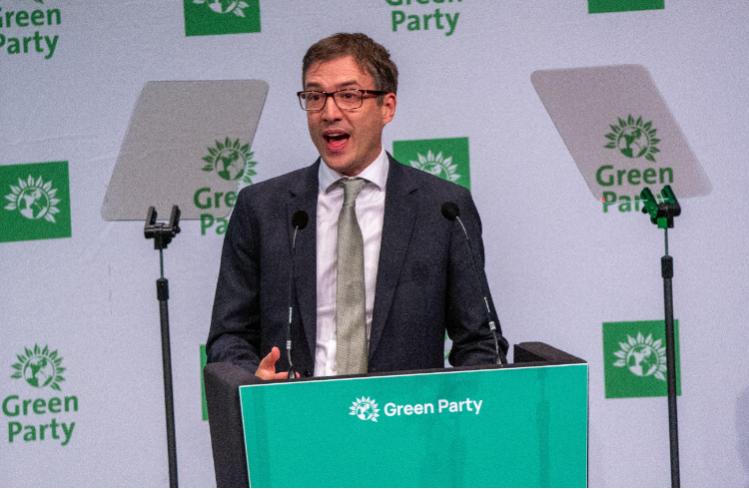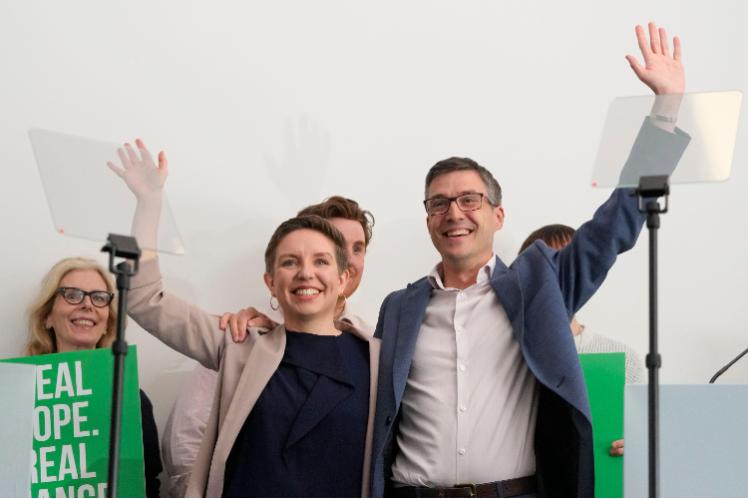Adrian Ramsay: 'We need less of the horrific yah-boo style approach we see in the Chamber'
Adrian Ramsay (Credit: Associated Press / Alamy Stock Photo)
8 min read
Green Party co-leader Adrian Ramsay speaks to Sophie Church about why Labour should take ‘another look’ at its tax on farming, and the ‘ridiculous’ notion he is against net-zero
With farmers taking to the streets to protest Labour’s plans to reduce tax relief on inherited land, Green Party co-leader Adrian Ramsay tells The House that the government should take “another look” at its plans.
“The government’s got into a muddle over its figures, and there’s disagreement between different departments about how many farms would actually be caught up by this planned tax,” he says.
“The government needs to have another look at what it’s got planned and be able to make a clear distinction between people who are speculating in buying up land and actual family farms.”
Cost is a factor, of course it is. It’s not the only factor
While only one of four Green MPs, Ramsay has proved he is no shrinking violet in Westminster. Within days of the general election, Ramsay was calling for a “pause” in the building of a pylon line running through his Waveney Valley constituency.
The irony of a Green Party MP seemingly opposing a step to reach net-zero was red meat for Labour; the Prime Minister told Ramsay to “show some leadership”, while the party cried “hypocrisy”.
Green Party insiders were surprised at Ramsay’s intervention, and he was advised to focus instead on his experience in the renewable energy sector.
 Adrian Ramsay (Credit: Gary Roberts photography / Alamy Stock Photo)
Adrian Ramsay (Credit: Gary Roberts photography / Alamy Stock Photo)
Right on cue, Ramsay tells The House: “I’ve spent the last 10 years leading national charities that are all about upscaling renewable energy and addressing the barriers to that, including advocating for improving the capacity of the grid.”
“This is being presented as a simple question of being pro or anti-renewable energy, which is ridiculous frankly, because obviously we need to upgrade to the grid to improve renewable energy infrastructure,” he adds. “But it’s then about how you best do the connectivity infrastructure.”
Ramsay, 43, was born in Norwich, educated at the City of Norwich School, and studied at the University of East Anglia. At 21, Ramsay was elected to Norwich city council, making him one of the youngest councillors in the UK at the time. He has stood for Parliament twice before – in 2005 and 2010 – but failed on both occasions to be elected.
This year, Ramsay fought a slick, grassroots election campaign in Waveney Valley, convincing traditionally Conservative-voting, environmentally focused rural folk to put their trust in the Green Party.
Now, he says putting in place the “best” infrastructure possible means doing it in a way “that takes communities with us”, in seeming acceptance that his constituents’ rejection of pylons – which they call a “blight” on the environment – could presage a rejection of the Green Party if the scheme goes ahead.
Does he feel any added pressure as a Green MP, tasked with protecting the environment and paving the way to net-zero?
“No,” he says. “I’ve made the arguments that I’ve made, and when I get into conversation with residents about it, or with NGOs about it, they appreciate that. Any issue has its complexities, and I’ve been very clear that we’ve got to do the infrastructure in the right way that brings communities with us and that has the right solutions for the long term.”
Ramsay is now calling for an options assessment to explore alternatives to pylons: carrying electricity via underground or offshore cables, for instance.
Would he be happy with potentially increasing the burden for the taxpayer with these more expensive options?
“Cost is a factor, of course it is. It’s not the only factor,” he says, adding that the impact on nature, farming, traffic, landscape, and heritage must also be considered. “It’s about the infrastructure investment that we need; it shouldn’t be about increasing bills.”
Ramsay insists if bills do rise, the Green Party would want this burden to fall on “the very richest in society”. But “in terms of infrastructure investment”, the Greens are “looking more at borrowing”, in the wake of the government’s loosening of fiscal rules.
Having had the space to make his case on pylons, Ramsay thinks there are “points to address around culture” in Westminster, which would “encourage a more mature debate” around issues like these.
“We do need to be able to have a grown-up discussion on issues like this without people trying to overly simplify it and produce simplistic headlines,” he says. Westminster Hall-style debates, where ministers are more likely to give an “engaged and reasoned response”, would be an improvement, he believes.
We need to see less of the horrific yah-boo style approach that we see in the Chamber
“We need to see more of that in Parliament and less of the horrific yah-boo style approach that we see in the Chamber, where I have seen front benchers literally sitting and just shouting at the other side as they speak.
“It’s not what people want to see, and it’s not what this place is actually like outside of those high-profile times. We need to bring about a different, constructive and respectful culture.”
While Ramsay has been criticised for his attempts to reconcile some of the competing interests between the natural environment and net-zero, he doesn’t think the government is even “close to grasping” the opportunities of the former.
“Whilst Labour has got the bit between the teeth on renewable energy, it has far less so on the natural environment,” he says.
“We could be supporting the natural carbon capture through massive scaling up of restoring woodlands, peatlands, wetlands – that has all sorts of other benefits as well, from a point of view of biodiversity, from the point of view of natural flood management. These things at the moment are happening at a very small scale.”
With four MPs in Westminster, the Green Party is stepping up its media appearances – the party is pleased with Ramsay’s co-leader Carla Denyer becoming an ever more recognisable name – in an attempt to project power from the wings.
However, behind closed doors, the party is navigating a fierce debate on gender issues, which some say could tear the party apart. The House revealed last month that the Green Party had spent £1m fighting legal battles against its own members, many of whom have brought cases against the party alleging discrimination over their gender-critical views.
The Green Party has been conspicuously silent in the face of these allegations, declining to comment on an issue that is threatening the party’s financial stability.
Today, Ramsay says he has “nothing new” to add to the debate. “You’ve probably seen that I’ve said quite a bit on this in interviews at different times. I don’t think I’ve got anything new to say on it at the moment, because we’re very much in discussion behind the scenes about how best to address the situation as it stands at the moment.”
Pushed further, he adds: “You’ll appreciate that in any organisation, there are times when you might make a comment public, and there are times when you’re focused on discussing issues with colleagues. I think I’m in the latter point at the moment.”
 Adrian Ramsay and Carla Denyer (Credit: Associated Press / Alamy Stock Photo)
Adrian Ramsay and Carla Denyer (Credit: Associated Press / Alamy Stock Photo)
A Green Party insider sympathises with Denyer and Ramsay’s position as leaders. Speaking out on such a divisive issue, they say, would risk losing the support of key individuals within the party. Green Party members will be the first to say when they feel they have been wronged, they add, making Ramsay’s juggling of the issue all the more difficult.
The only solution would be for those willing to listen to each other to sit round a table and work out their differences – but there is no plan as yet to make that happen.
With internal battles raging, and leadership elections scheduled for next autumn, will Ramsay stay on as co-leader?
Ramsay is characteristically guarded in his answer. “When Carla and I were first elected three years ago, we set out a clear vision for what we wanted to do in the run up to this general election, and we had some goals along the way,” he replies. “We met all those goals which is fantastic.”
But with Donald Trump now back in the White House and Europe tilting rightwards, does Ramsay worry that the Green Party’s rapid growth may falter?
“I don’t think there’s any way that Donald Trump would be elected by the UK public if he stood here,” he says. “People prefer a different style of politics. I don’t think there’s a direct comparison at all.”
Trump’s victory has not dented Ramsay’s optimism that the Greens will increase their number of MPs at the next election. However, he refuses to put a figure on how many MPs he expects the party to win; it is simply “too early to say”.
“Our local parties know that if they want to make a case for their area to be a target seat for the next election, showing how they can make big inroads in the local elections in the meantime – starting with the county council elections in May – is the key thing they need to focus on.”
Ramsay says he feels “more at home” in his constituency than in Westminster, and there is little sign he is willing to be moulded to fit into the world of SW1. Instead, he wants Parliament to change: the next day, he speaks to the Modernisation Committee about the “arcane” and “inefficient” way it works.
“I’m very keen to work in a constructive cross-party way and have a practical impact,” he says.
“I’m not just here to wave flags.”
